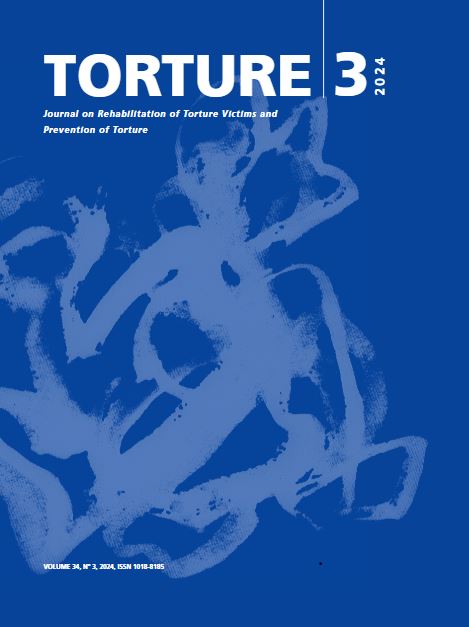CALL FOR PAPERS - SPECIAL SECTION ON ISRAEL & OCCUPIED PALESTINE
The Palestinian people have endured a protracted process of occupation by Israel. This has resulted in a plethora of documented instances of human rights violations. One year after the Hamas attacks on 7th October 2023 in Israel and Israel's military campaign and associated grave human rights violations in Palestinian territory and other related Arab countries, it is an important duty to analyse emergent issues from a human rights perspective and for the Torture Journal to do so on matters within its scope.
To conduct an analysis in the context of an ongoing war and enormous suffering is undoubtedly complex. But epidemiology and health sciences have insights to contribute which go beyond calls for a cessation of violence and thus there is an ethical duty to try to do so.
From this standpoint, Torture Journal encourages the submission of academic papers that contribute to a more comprehensive and evidence-based understanding of torture, ill-treatment, and associated human rights violations in the current context, including legal, psychosocial and community impacts and peace-building through justice.
In pursuit of this, Torture Journal, as a space for reflection on torture, its impacts and models of prevention and rehabilitation, has constituted a broad set of editors, based on its Editorial Board and invited guests from different fields, to ensure a plurality of perspectives and an evidence-based approach.
Torture Journal encourages authors to submit papers on the Israeli-Palestinian situation, particularly those which are interdisciplinary.
We welcome papers on:
- The definition of torture, torturing or coercive environments, and epidemiological studies on its prevalence and characteristics in the framework of the conflict and the occupation.
- Particular victim groups, locations, specific vulnerabilities, concerning risks, impacts and needs, including, for instance, mental health patients, older adults or pregnant women.
- The situation for children growing up under an ongoing and armed conflict – consequences and possible remedies.
- Impacts and care of health workers amidst the conflict.
- Aspects related to the situation in places of detention or deprivation of liberty, official or clandestine, including both detainees, prisoners, hostages or any other form of deprivation of liberty.
- Sociological, psychosocial or anthropological work in connection with the field of torture and coercive or torturing environments in both Israel and Israeli occupied territories.
- Legal discussions in relation to applications before International Courts.
- Psychosocial and community impacts and interventions within the population.
- Forensic assessment of cases based on the Istanbul Protocol.
- Effective rehabilitation practices for civil society amidst the conflict.
- Transitional justice, peace-building and justice interventions involving torture survivors.
Submission guidelines
- For general information on the Journal and submission guidelines, please see the website (https://irct.org/torture-journal).
- For instructions for authors: https://tidsskrift.dk/torture-journal/information/authors
- For submissions: https://tidsskrift.dk/torture-journal/about/submissions
Deadline for submissions: 30th April 2025
For more information. If potential authors doubt the suitability of their contributions, they can send an outline of the paper to the Editor-in-Chief for additional guidance.
- Pau Pérez-Sales, Editor-in-Chief (pauperez@runbox.com)
- Berta Soley, Editorial Assistant (bso@irct.org)
Submission guidelines and links
- Author guidelines can be found here: https://irct.org/wp-content/uploads/2023/01/Torture-Journal-formatting-checklist-for-author-v0-updated-Jan-2019-OTH.pd
Special Section Editors: Malcolm Evans (UK), Jens Simon Modvig (Denmark), Daniel Weishut (Israel), Tania Herbert (Australia), John Schiemann (US), Mahmud Sehwail (Palestine), Nora Sveaass (Norway)
Read more about CALL FOR PAPERS - SPECIAL SECTION ON ISRAEL & OCCUPIED PALESTINE

